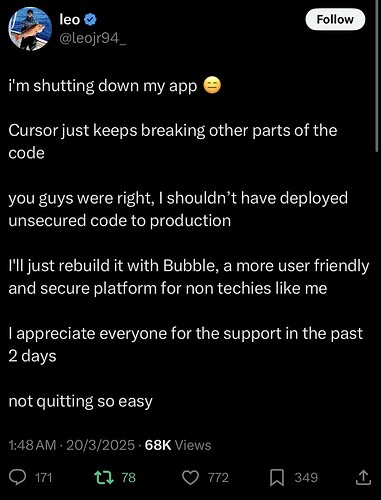I’ve been thinking about these questions a lot lately. Do Bubble skills become redundant within the next 12 - 24 months? Can Bubble meaningfully compete with AI coding agents?
What is Bubble’s unique value proposition 12 months from now? Should I be exploring alternative career options and if so how aggressively should I do so?
The umbrella question becomes, do AI agents really replace us all?
My opinion is initially YES, but eventually NO. Please feel free to agree or disagree with me in the comments of this post as I state my case.
The current global economic model that all emerging and leading economies subscribe to is founded in the basic principle of globalization and economic specialization.
Globalization can be understood through the lens of specialization, historical advantages, and the random displacement of natural resources. These factors foster economic interdependence among nations, where countries focus on producing goods or services in which they have a comparative advantage. These advantages often stem from historical developments, geographical positioning, or the availability of specific natural resources.
Now! Does the AI agent model fit into the current global economic structure where countries produce things that they have a comparative advantage in? Before we answer that question, lets try and dissect what exactly qualifies as an AI agent, what is their unique value proposition and how does the AI agent model affect non-AI specialized nations (pretty much every country but the United States and potentially China).
I asked Copilot what an AI agent is and here is what it said: "An AI agent is a computer program or system designed to perceive its environment, process information, and take actions to achieve specific goals." Sounds a lot like what humans do in the workplace right? but wait … there’s more.
Copilot: “AI agents excel in specific areas, especially where speed, accuracy, or handling large amounts of data are involved.” Copilot failed to mention that at some point AI agents will develop better reasoning abilities than the average human worker.
So in a world where AI agents are faster, smarter and less prone to human error than human workers … how do people and by extension Bubble devs compete?
Well before we try and answer that question, lets introduce a concept I call AI agent maturity. I use this term to loosely define AI agents that can economically complete highly complex tasks without human intervention. Other people might call this AGI.
When AI agents reach maturity, people and by extension Bubble devs cannot compete at all … at first!
This brings me back to my point where I very boldly stated that people and (once again by extension Bubble devs) get their jobs back. How does this happen? Well to explain how this happens lets draft a little case study based on a singular country, Germany.
Germany has approximately 1 million software developers source. For the sake of this case study, let us assume that the average software developer in Germany earns $40 000/year and pays 30% income tax to the German government. If this is true then the German government collects 0.3x40000x1000000 ($) in tax revenue per year. This equates to 12 billion usd in tax revenue collected annually from German software developers.
Now assuming that AI agents are fundamentally human replacement software and AI Agent maturity is achieved, 1 million German devs would at least temporarily be displaced and the 12 billion usd in market value would be injected into AI superpowers (ceteris paribus) namely the United States and China.
This case study makes a lot of assumptions, many of them not theoretically sound. However, this case studies aims to pursuade that the AI agent model doesn’t fit into the current global economic structure as the only significant winners would be AI superpowers. Governments of non-AI specialized countries would have an obvious incentive to collectively ban human replacement technology at a large enough scale. And that is where we get when we get our jobs back.
This is purely a speculative article inspired by the current global economic structure. Please feel free to share your thoughts.
[I just so happen to be a front-end dev who’s open to work. Consider shooting me a direct message if you have an open position.]
Looking forward to all your thoughts on whether we should be worried as Bubble devs or not and why?




